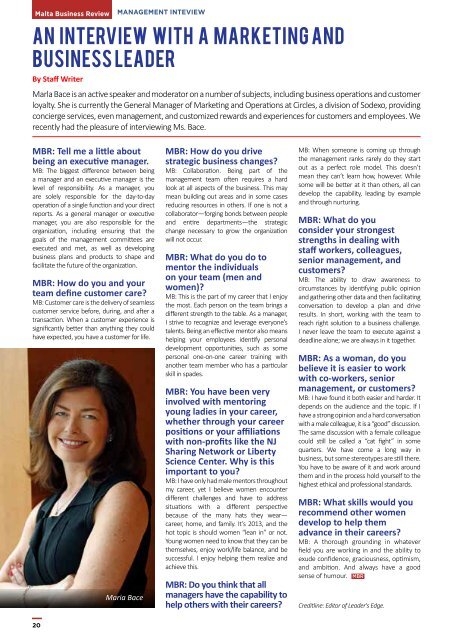MBR_ISSUE 43_LOWRES
Create successful ePaper yourself
Turn your PDF publications into a flip-book with our unique Google optimized e-Paper software.
Malta Business Review<br />
MANAGEMENT INTEVIEW<br />
AN INTERVIEW WITH A MARKETING AND<br />
BUSINESS LEADER<br />
By Staff Writer<br />
Marla Bace is an active speaker and moderator on a number of subjects, including business operations and customer<br />
loyalty. She is currently the General Manager of Marketing and Operations at Circles, a division of Sodexo, providing<br />
concierge services, even management, and customized rewards and experiences for customers and employees. We<br />
recently had the pleasure of interviewing Ms. Bace.<br />
<strong>MBR</strong>: Tell me a little about<br />
being an executive manager.<br />
MB: The biggest difference between being<br />
a manager and an executive manager is the<br />
level of responsibility. As a manager, you<br />
are solely responsible for the day-to-day<br />
operation of a single function and your direct<br />
reports. As a general manager or executive<br />
manager, you are also responsible for the<br />
organization, including ensuring that the<br />
goals of the management committees are<br />
executed and met, as well as developing<br />
business plans and products to shape and<br />
facilitate the future of the organization.<br />
<strong>MBR</strong>: How do you and your<br />
team define customer care?<br />
MB: Customer care is the delivery of seamless<br />
customer service before, during, and after a<br />
transaction. When a customer experience is<br />
significantly better than anything they could<br />
have expected, you have a customer for life.<br />
Maria Bace<br />
<strong>MBR</strong>: How do you drive<br />
strategic business changes?<br />
MB: Collaboration. Being part of the<br />
management team often requires a hard<br />
look at all aspects of the business. This may<br />
mean building out areas and in some cases<br />
reducing resources in others. If one is not a<br />
collaborator—forging bonds between people<br />
and entire departments—the strategic<br />
change necessary to grow the organization<br />
will not occur.<br />
<strong>MBR</strong>: What do you do to<br />
mentor the individuals<br />
on your team (men and<br />
women)?<br />
MB: This is the part of my career that I enjoy<br />
the most. Each person on the team brings a<br />
different strength to the table. As a manager,<br />
I strive to recognize and leverage everyone’s<br />
talents. Being an effective mentor also means<br />
helping your employees identify personal<br />
development opportunities, such as some<br />
personal one-on-one career training with<br />
another team member who has a particular<br />
skill in spades.<br />
<strong>MBR</strong>: You have been very<br />
involved with mentoring<br />
young ladies in your career,<br />
whether through your career<br />
positions or your affiliations<br />
with non-profits like the NJ<br />
Sharing Network or Liberty<br />
Science Center. Why is this<br />
important to you?<br />
MB: I have only had male mentors throughout<br />
my career, yet I believe women encounter<br />
different challenges and have to address<br />
situations with a different perspective<br />
because of the many hats they wear—<br />
career, home, and family. It’s 2013, and the<br />
hot topic is should women “lean in” or not.<br />
Young women need to know that they can be<br />
themselves, enjoy work/life balance, and be<br />
successful. I enjoy helping them realize and<br />
achieve this.<br />
<strong>MBR</strong>: Do you think that all<br />
managers have the capability to<br />
help others with their careers?<br />
MB: When someone is coming up through<br />
the management ranks rarely do they start<br />
out as a perfect role model. This doesn’t<br />
mean they can’t learn how, however. While<br />
some will be better at it than others, all can<br />
develop the capability, leading by example<br />
and through nurturing.<br />
<strong>MBR</strong>: What do you<br />
consider your strongest<br />
strengths in dealing with<br />
staff workers, colleagues,<br />
senior management, and<br />
customers?<br />
MB: The ability to draw awareness to<br />
circumstances by identifying public opinion<br />
and gathering other data and then facilitating<br />
conversation to develop a plan and drive<br />
results. In short, working with the team to<br />
reach right solution to a business challenge.<br />
I never leave the team to execute against a<br />
deadline alone; we are always in it together.<br />
<strong>MBR</strong>: As a woman, do you<br />
believe it is easier to work<br />
with co-workers, senior<br />
management, or customers?<br />
MB: I have found it both easier and harder. It<br />
depends on the audience and the topic. If I<br />
have a strong opinion and a hard conversation<br />
with a male colleague, it is a “good” discussion.<br />
The same discussion with a female colleague<br />
could still be called a “cat fight” in some<br />
quarters. We have come a long way in<br />
business, but some stereotypes are still there.<br />
You have to be aware of it and work around<br />
them and in the process hold yourself to the<br />
highest ethical and professional standards.<br />
<strong>MBR</strong>: What skills would you<br />
recommend other women<br />
develop to help them<br />
advance in their careers?<br />
MB: A thorough grounding in whatever<br />
field you are working in and the ability to<br />
exude confidence, graciousness, optimism,<br />
and ambition. And always have a good<br />
sense of humour.<br />
<strong>MBR</strong><br />
Creditline: Editor of Leader's Edge.<br />
20

















